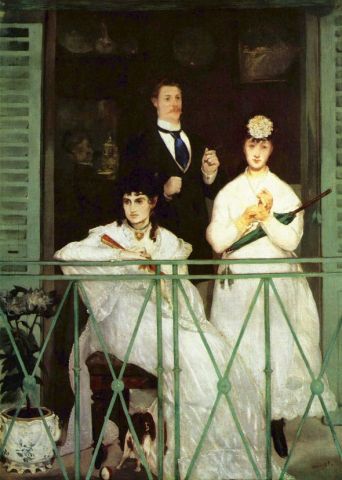THE BALCONY by Salvatore Buttaci
THE BALCONY (LE BALCON) BY EDOUARD MANET (1869)
Whenever I look at a famous painting, I often wonder what the model was thinking about as he or she tried hard to maintain the pose given by the painter. Pressing concerns? Daily problems? Love gone sour? New-found love? And in a still life who owns the dish of fruit, the bouquet of flowers, the wine bottle?
What we see in a painting is the stillness of stopped time, a scene captured on canvas. Light and shade remain forever what they were in those moments when the painter decided them for his or her subject. Like the eye of a camera the painter makes the changing changeless. He saves it.
The following poem in my French-paintings collection shares its title with the famous French painting The Balcony (Le Balcon) by Edouard Manet (1869).
Before I wrote each poem, I allowed myself some time to study the painting, to get a feel for whatever humanity I felt was connected with it. I chose the narrative poem to tell the story of each work of art. I wanted each painting to come alive for me. I wanted each poem to express that life, to recapture those moments lost in time when the painting was originally done.
For me these narrative poems place some of my favorite paintings in some sort of context, and in that way make them come alive for me. The old adage not withstanding that a picture is worth a thousand words, I do hope you will enjoy reading my poem while studying the accompanying art work.
THE BALCONY
(Painting: Edouard Manet, 1868-1869;
Poem: Salvatore Buttaci)
I
(Madame Francine)
From this balcony all of Paris is my backyard!
Years ago when the children were young--
Charles and Beatrice and Marianne--
years ago when George was with us--
we would sit out here, especially
during the oppressive summer months
when the only breeze was here and nowhere else,
we would pass the early evenings
in family conversations.
How I truly miss those days!
They were happy times you can be sure.
Where have they all gone?
Sometimes, if I permit myself the luxury
of listening to the voices in my memory,
I can distinctly hear George's laughter
right here on this balcony;
I can remember scolding him for
bellowing out that raucous laugh of his,
that same laugh I wish I could hear today!
II
(Robert Francine)
It looks like rain; that is to say,
it appears as though it will come down
in a torrent before the evening's through.
Mother loves her balcony.
It is her favorite place to reminisce
about what she calls "the better days."
I suspect, with Father gone, she's lonely,
despite the lot of us who try our best
to make her feel life is worth living.
"Remember when your father--"
she will say, "remember when he--"
this or that, "and he would--" this or that.
There are times when I am so tempted
to interrupt her stories, be rude enough
to say, "My dear Mamma, we have heard
that one before!" but it would be unkind.
There are evenings after dinner
when I ought to return to the bank,
to my ledgers, to the clerks there,
but instead I stand here on this balcony
with Mamma' and with Paulette.
III
(Paulette Francine)
He asks me, "Why the faraway look?
Where are you when you should be here?"
I ought to say to him: "I want to go
where this look of mine will take me--
far away, Robert! Far far away."
He does not comprehend.
For him life is what he sees
through the proverbial glasses
that show all things rosy and sweet.
He does not understand
how a heart can yearn for happiness,
and not finding it, one day come apart.
I ought to say to him, "Robert,
what is this life of ours?
The love you once promised me--
where is it, and why from this balcony
do I see the passersby, hear their
laughter, their singing in the street,
and, God forgive me, envy their lives!"
There! I've said it.
Oh, Robert, if only I could say it out loud,
leave this balcony and be free.
#
© 1994 Salvatore Buttaci
The above poem first appeared in my book Impressions: 13 French-Painting Poems (Saddle Brook, NJ: New Worlds Unlimited), 19-20.
Salvatore Buttaci’s work has appeared widely in publications that include New York Times, U. S. A. Today, The Writer, Writer’s Digest, Cats Magazine, The National Enquirer, Christian Science Monitor, A Word with You Press, Thinking Ten, Pen 10, Six Sentences, and Author's Info. He was the recipient of the $500 Cyber-wit Poetry Award in 2007. He was also one of the winners in the 2011 Franklin-Christoph Fine Writing Instrument Poetry Contest.
His collection of flash fiction, 200 Shorts, is the new follow-up to his collection of 164 short-fiction stories, Flashing My Shorts. Both published by All Things That Matter Press are available in book and Kindle editions at http://www.kindlegraph.com/authors/sambpoet
His new book If Roosters Don’t Crow, It Is Still Morning: Haiku and Other Poems:
Buttaci lives in West Virginia with Sharon, the love of his life.
When you subscribe to the blog, we will send you an e-mail when there are new updates on the site so you wouldn't miss them.



Comments